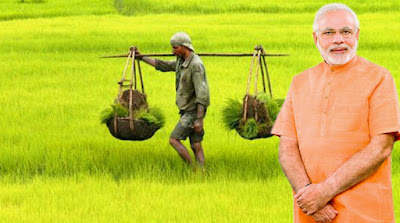Open Letter to Hon'ble Prime Minister of India to address challenges of common man
Open Letter to Mr. Modi, Hon'ble Prime Minister of India to address Challenges of Food Inflation in Budget
To,
Hon'ble Prime Minister of India
Prime Minister's Office
New Delhi
Happy New year to you and your Cabinet colleagues.
Now onwards, food inflation will be the major challenge for economic recovery of India. When average citizen is already spending more than 60% of income on food, and remain goes for house rent, medical bills, education, local transport, social security. After these basic needs, where is the money in the hands of consumers to purchase non-food items and support economic recovery. Where is the money to pay EMIs for housing, vehicles and other items. People are not enjoying even festivals now a days due to inflation.
Cost of education and healthcare is already becoming illogically high and no attempt is there to control these extortions imposed by essential services providers on citizen unregulated education and healthcare sectors. Sir, Do you have any plans to control these costs as well?
Sir, I have few points for your Consideration means Government of India to improve Agriculture sector in India to control food inflation. Hope you will consider them within your cabinet before rejecting the outright.
Preamble: Why Agriculture will be biggest challenge for Modi government?
1. Per
capita of most food availability is going down.
2. Food
inflation is going up.
3. Soil
health is going down.
4. Water
table is going down.
5. Productivity
of most crops are stagnant, because seed replacement rate is one of the lowest
in BRICS nations and major agriculture trading nations.
6. Food
wastage is going up due to lack of warehousing infrastructure.
7. India
has largest number of malnourished people in the world.
8. India
is the largest consumer market for most agriculture commodities but, price
discovery mechanism for crops is missing from the marketing system. India
industry depends upon international market for price discovery.
9. There
is acute shortage of fodder in the country impacting yield per animal.
10. By-product
utilization should be encouraged and most of them is burnt in farms leading to
pollution and wastage of biomass.
Sir, following points are for your consideration to address the challenges faced by Agriculture in coming months:
a) Agriculture
is the state subject and there is no coordination between states about their
demand and supply requirements to encourage interstate agriculture trade.
b) Individuals
State agricultures policies are not in line with national objective. These
state level policies lack vision and don’t reflect national agenda in their agriculture
policy planning. Fragmented approach in agriculture planning leading to poor
resource utilization, more wastage and more dependency on imports and unable to
manage food inflation.
c) India
is party to Free trade agreement under WTO but there is no free trade agreement
between states within India. There are many restrictions while trading within
India in agriculture commodities.
d) Time
consuming registration procedures are discouraging investments and innovations within
approved policy.
e) There
is no incentives for corporates to promote modern knowledge transfer to farmers
in remote areas.
f) Lack
of policy to promote private invest in agriculture education and research is
hurting innovation and skill development. There is monopoly of ICAR in
agriculture education, research and extension. Why private investment is not encouraged
like in IT sector. There should be bidding for research project funds with private sector.
g) Private
investment in agriculture infrastructure will be discouraged the way stock
limits are imposed under Essential Commodity Act.
h) Government
should come out with agriculture production policy to produce oilseeds and
pulses for India in line with coal and petroleum policy where corporates are encouraged
to acquire asset for oil and coal outside India.
i) Railway
assets in remote areas should be used to create agriculture related infrastructure
to ensure faster and cost effective movement of goods from production to consumption
areas with less wastage. Railway can also make more money.
j) Cost
effective Post-harvest management should be priority to conserve what is produced.
Simple concepts like fumigation and coatings can prevent food losses to great
extent. Food processing is not viable in high cost economy with food inflation and control orders under Essential Commodity Act.
k) Agriculture
credit and insurance should be linked to soil health of the agriculture farms.
l) Central
Crop disease control and management system should be developed in coordination with
Indian meteorology and remote sensing stations. Advance warning to farmers can
help in better disease management.
m) Mobile
money platforms should be encouraged in commodity trading to ensure
accountability of transactions and this will prevent black money generation.
n.) Pl. make all water saving technologies used in agriculture tax free. These should be audited and verified by competent institutions before offering tax incentive.
n.) Pl. make all water saving technologies used in agriculture tax free. These should be audited and verified by competent institutions before offering tax incentive.
Proper and sensible Agriculture development policies can help in
better management. This will address the following issues.
1.
Agriculture Productivity
2.
Farmers’ Income
3.
Risk Management
4.
Capital Formation in rural India
5.
Private investment in agriculture infrastructure
sector
6.
Rural Employment generation
7.
Foreign exchange conservation and
earning
8.
Food Inflation
9.
Population migration
10. Prevent
Pollution due to burning of biomass
11. Will
address malnourishment status of India
12. Will address climate change challenges
Sir, looking forward for affordable food for common man in India. This was your election promise as well.
with best regards,
Sincerely yours'
Vijay Sardana
Citizen of India



Comments
Post a Comment